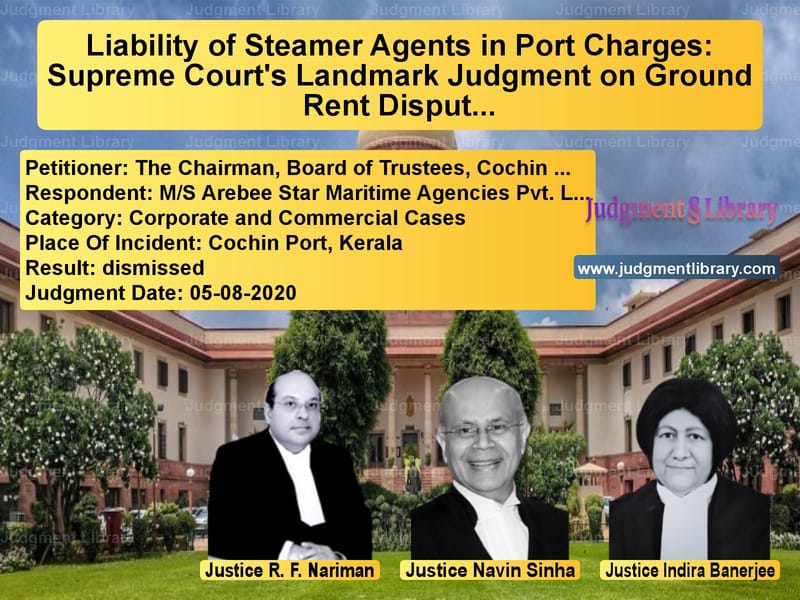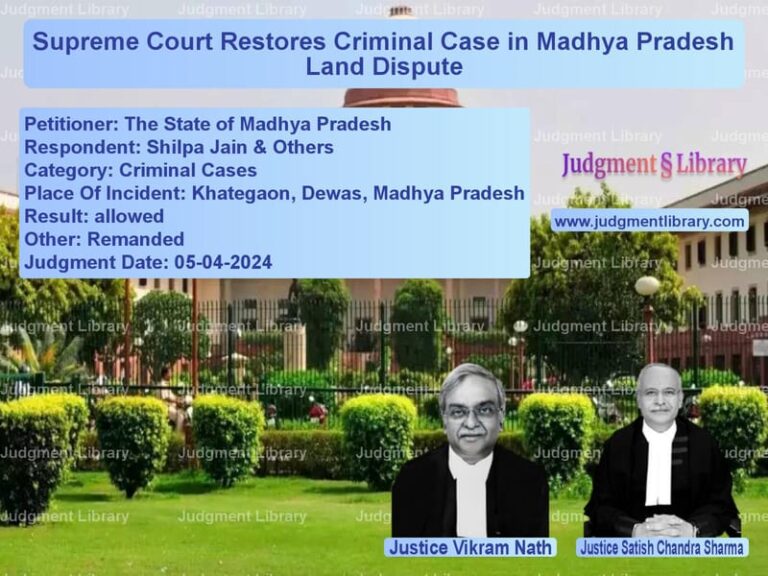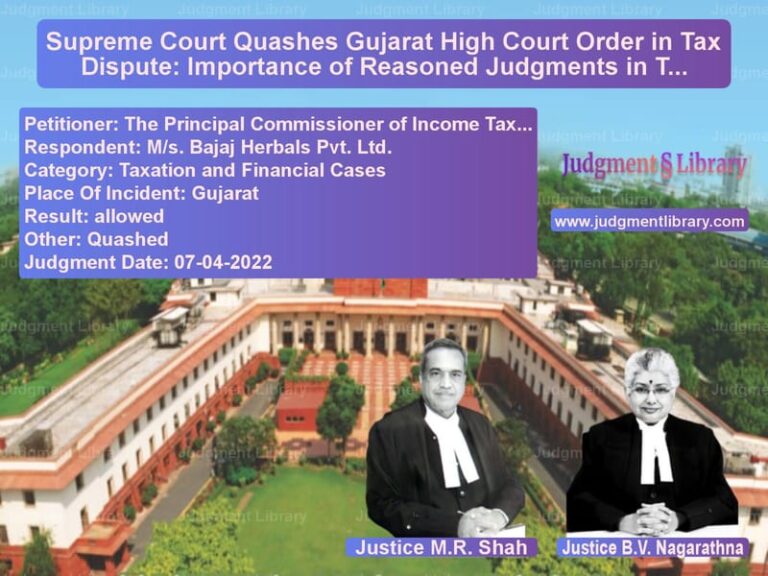Liability of Steamer Agents in Port Charges: Supreme Court’s Landmark Judgment on Ground Rent Dispute
The Supreme Court of India, in a detailed judgment dated August 5, 2020, examined the legal and financial liabilities of steamer agents and port trusts regarding the imposition of ground rent charges for containers lying uncleared at Cochin Port. The case revolved around whether steamer agents could be held liable for paying ground rent beyond the prescribed period of 75 days under the Tariff Authority for Major Ports (TAMP) regulations. The decision has significant implications for port operations, shipping agents, and cargo handling in India.
This case arose from multiple appeals filed by steamer agents against the Cochin Port Trust’s demand for extended ground rent payments. The key contention was whether the steamer agents could be made liable for charges beyond 75 days when the consignees failed to clear their cargo. The Court meticulously analyzed previous judgments and statutory provisions to resolve the inconsistencies in liability allocation.
Background of the Case
The issue originated in 1998 when synthetic woolen rags and other goods were imported into Cochin Port. These goods were stored in containers, awaiting customs clearance. However, the consignees did not clear the goods in time due to various reasons, including disputes with customs authorities regarding the classification and valuation of the goods. As a result, the goods remained in the port premises for an extended period.
Since the containers were not destuffed, the Port Trust imposed ground rent charges on the steamer agents who had facilitated the import. The steamer agents contended that their liability should be limited to the first 75 days, as per the orders of the Tariff Authority for Major Ports (TAMP). However, the Port Trust insisted that the liability continued until the goods were removed.
Key Legal Questions
The Supreme Court identified several key legal questions that needed to be addressed:
- Whether the steamer agents could be held liable for ground rent beyond 75 days.
- Whether the responsibility for clearing cargo and paying charges rests with the consignee, the Port Trust, or the steamer agents.
- Whether the statutory provisions under the Major Port Trusts Act, 1963, provide discretion to the Port Trust in collecting charges.
- The impact of previous Supreme Court judgments on the liability of steamer agents.
Arguments by the Petitioner (Cochin Port Trust)
The Cochin Port Trust argued that:
- The steamer agents were responsible for ensuring that the goods were cleared promptly.
- The liability to pay demurrage and ground rent continued until the containers were removed, regardless of TAMP regulations.
- The Port Trust acted as a bailee and had the right to recover storage charges from the steamer agents until the consignee took delivery.
- Past judgments supported the view that shipping agents could be held liable for port charges.
Arguments by the Respondents (Steamer Agents)
The steamer agents countered these claims with the following arguments:
- They had no control over whether the consignee chose to clear the goods or abandon them.
- The Tariff Authority for Major Ports (TAMP) had set a 75-day limit on ground rent charges, beyond which liability should not extend to the steamer agents.
- The Port Trust failed to destuff the containers despite repeated requests, leading to unnecessary delays.
- The liability should rest with the consignee or owner of the goods, not the steamer agents who only acted as intermediaries.
Supreme Court’s Observations
The Supreme Court extensively reviewed the provisions of the Major Port Trusts Act, 1963, and various past judgments, including:
- Rowther-I Case (1963): Held that the Port Trust takes charge of the goods from the shipowner as a bailee.
- Rowther-II Case (1997): Held that once the bill of lading is endorsed and a delivery order is issued, the liability of the steamer agent ceases.
- Forbes-II Case (2015): Established that storage charges should be borne by the owner or consignee of the goods, not the steamer agent.
The Court noted that the previous judgments had not followed a consistent approach in determining liability, which necessitated a fresh analysis. The following key observations were made:
- The liability of a steamer agent should be limited to the period before the Port Trust takes charge of the goods.
- Once the Port Trust issues a receipt and assumes responsibility for the goods, the consignee or owner of the goods becomes liable for further charges.
- The term “may” in Sections 61 and 62 of the Major Port Trusts Act should not be read as “shall,” meaning that the Port Trust has discretion in selling unclaimed goods but must act reasonably.
- The Port Trust cannot indefinitely impose charges on steamer agents when consignees abandon their cargo.
- The principle of fairness under Article 14 of the Constitution mandates that the Port Trust must dispose of goods within a reasonable time and not unduly burden steamer agents.
Final Verdict
After thorough deliberation, the Supreme Court upheld the Kerala High Court’s ruling that the liability of steamer agents for ground rent is limited to 75 days. The Court held that the Cochin Port Trust could not demand indefinite payment from steamer agents and that the onus of clearing and paying for stored cargo rests with the consignee.
The Court also emphasized that while the Port Trust has discretion under the Major Port Trusts Act, it must act in a fair and transparent manner. The judgment clarified that steamer agents should not be held liable for charges beyond their reasonable period of involvement in cargo handling.
Impact of the Judgment
This ruling has significant implications for the shipping and logistics industry in India:
- It provides clarity on the extent of liability of steamer agents and ensures fair treatment in port charges.
- It reinforces the obligation of consignees to clear their goods promptly.
- It restricts the ability of port trusts to impose prolonged storage charges on intermediaries.
- It establishes a legal precedent for similar disputes in other ports across India.
By resolving the ambiguities in previous judgments, this Supreme Court ruling ensures a balanced approach in determining responsibilities between steamer agents, port trusts, and consignees.
Petitioner Name: The Chairman, Board of Trustees, Cochin Port Trust.Respondent Name: M/S Arebee Star Maritime Agencies Pvt. Ltd. & Ors..Judgment By: Justice R. F. Nariman, Justice Navin Sinha, Justice Indira Banerjee.Place Of Incident: Cochin Port, Kerala.Judgment Date: 05-08-2020.
Don’t miss out on the full details! Download the complete judgment in PDF format below and gain valuable insights instantly!
Download Judgment: The Chairman, Board vs MS Arebee Star Mari Supreme Court of India Judgment Dated 05-08-2020.pdf
Direct Downlaod Judgment: Direct downlaod this Judgment
See all petitions in Company Law
See all petitions in unfair trade practices
See all petitions in Contract Disputes
See all petitions in Judgment by Rohinton Fali Nariman
See all petitions in Judgment by Navin Sinha
See all petitions in Judgment by Indira Banerjee
See all petitions in dismissed
See all petitions in supreme court of India judgments August 2020
See all petitions in 2020 judgments
See all posts in Corporate and Commercial Cases Category
See all allowed petitions in Corporate and Commercial Cases Category
See all Dismissed petitions in Corporate and Commercial Cases Category
See all partially allowed petitions in Corporate and Commercial Cases Category







